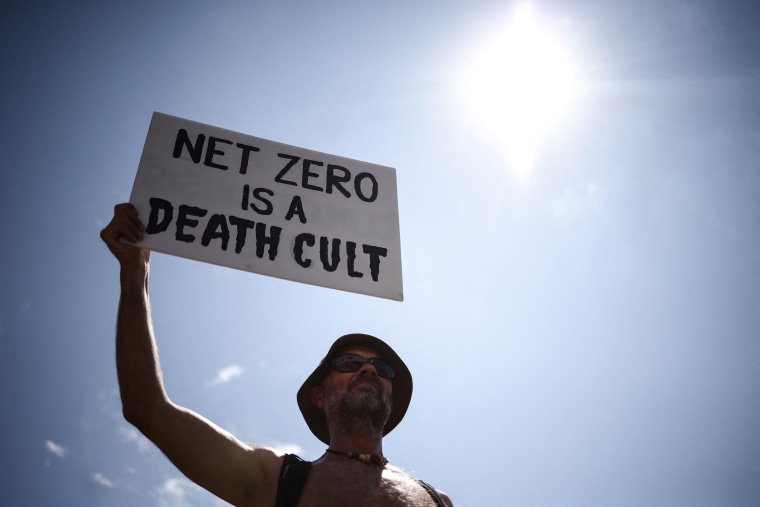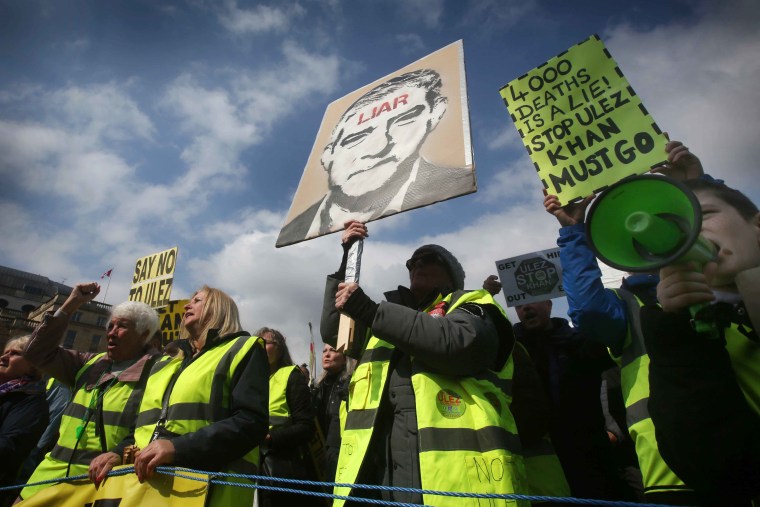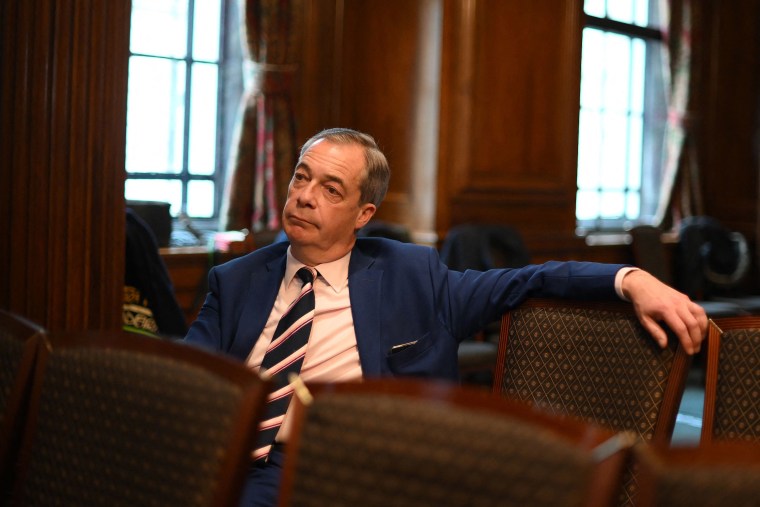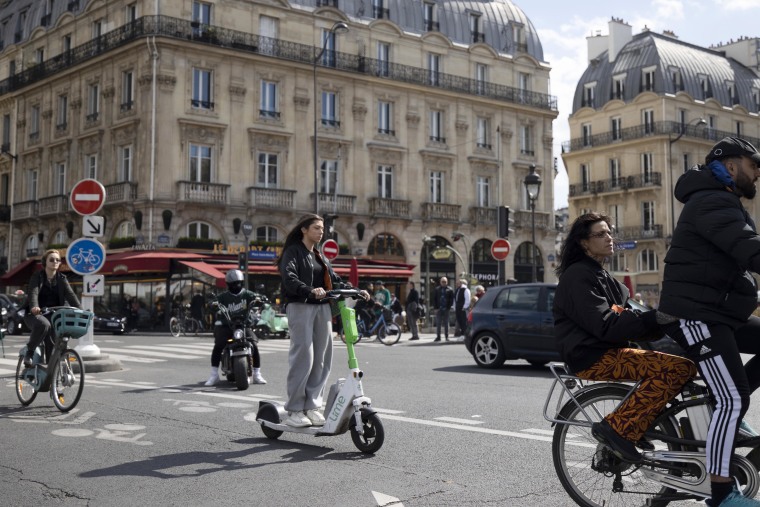
LONDON — According to committed conspiracy theorist and climate change skeptic Linda Skinner, the Covid-19 pandemic was just the start of the global elite’s effort to oppress the world.
What’s the shadowy cabal’s next goal? Take away your car, the Londoner said.
While there is no evidence such a plan exists, Skinner is part of a growing group that evolved out of anti-vaccine protests and has energized a campaign against environmental measures across Britain and elsewhere. Many of these fears are generalized into opposition to “15-minute cities,” an urban planning idea designed to reduce traffic and increase walking and cycling that has become an obsession of the post-pandemic protest movement.
“This is only the beginning,” said Skinner, 64, who works at a jewelers and believes Covid was developed and released by a shadowy and powerful group “as a trial to see how compliant people would be.”
The April demonstration was a protest against Mayor Sadiq Khan’s plan to charge people if they drove older, more polluting cars anywhere in the Greater London area.
Drivers already have to pay £12.50 ($15.50) to drive high-polluting vehicles, typically older diesel cars, in central boroughs, and beginning in August this will apply to all of Greater London, a huge geographic area.
It isn’t only about cars.
For a generation of anti-government protesters radicalized by their opposition to pandemic lockdowns, the latest protest movement is about what they claim are powerful global elites' efforts to control, divide and even dramatically reduce the world’s population.
These unfounded ideas are spilling over into the wider society.

Almost a third of people who took part in a recent poll by King’s College London and the BBC said it was either “definitely” or “probably” true that “15-minute city plans are a government attempt to surveil people and restrict freedoms.”
Experts increasingly see Covid and the resulting lockdowns, vaccines and restrictions as a watershed moment for conspiracy-driven anti-authority activists.
“If you look at the individuals that are complaining, spreading misinformation and legitimizing conspiracy theories about 15-minute cities, they’re often the exact same cohort of individuals that spread misinformation about Covid and often it’s the same language,” Tim Caulfield, an expert in misinformation at Alberta University in Canada, said.
While these conspiracy theories become commonplace — whether being repeated by Fox News pundits, Dutch farmers, British lawmakers or Austrian nationalists — Caulfield warns that they are still extreme and outlandish.
“One of the remarkable things is the normalization of hardcore conspiracy theories. This isn’t like conspiracy theory-light, it’s a hardcore conspiracy theory,” he said.
As the world grapples with rising temperatures and climate migration, more and more groups suspicious of the government’s motives will resist ecological measures and how they affect their lives, he warned.
'Tyrannical control'
In November, Duncan Enright, head of transport at Oxfordshire County Council, which covers an affluent and mostly rural part of southern England, suggested a pilot scheme to reduce traffic on six congested roads running across the city of Oxford. The traffic filter plans spearheaded by Enright were aimed at encouraging drivers to use the ring road to get around the city rather than cut across it.
Weeks later, Enright said he was receiving death threats, mostly through social media but also in emails and telephone calls — a target of activists who say green measures are nothing more than an instrument of a malign state and its secret backers. Enright was accused of answering to a cabal of globalist elites to subjugate the population and trap it in its neighborhoods.
“People turned up to a couple of our meetings and were talking about things which were nothing to do with this at all — describing why climate change didn’t exist. Very odd and quite alarming.”
The language used by some opposed to 15-minute cities can be extreme and even violent.
Nigel Farage, the far-right populist and former leader of the Brexit Party who unsuccessfully ran for Parliament seven times, said on Twitter last week: “Mark my words, this isn’t going to end with 20 mph zones and low traffic neighborhoods, no no, this is the beginning of climate lockdowns.”

At a protest in Oxford on Feb. 18, one placard said “THE 15-MINUTE WEF GHETTOS ARE NOT ABOUT CLIMATE. IT’S ABOUT TYRANICAL CONTROL.” Others went further and said the plan was comparable to Nazi “concentration camps’’ and the Warsaw Ghetto, which at its height 80 years ago housed 460,000 Polish Jews.
“A couple of people in my local town were making fun of me saying, you know, ‘Where’s your security detail?’ So it’s not at all a local thing, it’s using things that I’ve never really heard of. I’ve only really come across the World Economic Forum on the telly,” Enright said.
The traffic filter pilot was approved in October and there are no plans to halt the scheme.
A pyramid of priorities
The inventor of the 15-minute city concept has become a hate figure for those who rail against urban change in the name of environmentalism.
“It’s amazing to switch from being a researcher at a university to being a public enemy of the global movement of conspiracy theorists,” said Carlos Moreno, an associate professor at the IAE Paris Sorbonne Business School in Paris.
“It is the same people who are climate deniers, who thought Covid-19 was a biological weapon, [that] the vaccine was a way to introduce 5G into the body of people — they are manipulating the 15-minute concept [into] an open-air jail,” he told NBC News.
Around 2016, Moreno developed the idea that communities should be structured around people — not cars — and that everything someone might need during the day — from shops to schools, workplaces to doctors’ surgeries — should be within a 15-minute drive or cycle.
Modern cities have, he argues, given up far too much space to motorists.
Originally from Colombia, Moreno’s concept has been embraced by cities all over the world, including his adopted city of Paris, where Mayor Anne Hidalgo made reworking local areas to give priority to cyclists and pedestrians a pledge in her successful electoral campaign last year.

Moreno suggests a “pyramid of priorities” that put pedestrians in first place, followed by bicycles, public transport, electric cars full of passengers, taxis and regular private cars — in that order.
“No one is saying we need to control people, in fact it’s the opposite: This is a humanistic concept to allow more local services, more open spaces, more social interactions, a better local economy. This is not arduous,” he said.
Jonathan Tilt is a prominent anti-lockdown campaigner from West Yorkshire in northern England. Like so many, his political awakening was the pandemic, which he believes is connected to a concerted global effort to control and eventually depopulate the world.
“It will be sort of Soviet-style housing estates where you have to apply for permits to leave your house if you’re deemed as being essential in some way or other,” he said.
But crucially, whereas campaigning against Covid lockdowns was difficult during a time of national emergency, convincing people that the government wants to take away their cars is a much easier sell.
His group, Vote Freedom, said it supported more than 300 candidates at the local council elections across England on May 4, all of whom campaigned against 15-minute cities.
“Having stood [for election] campaigning against vaccines, campaigning on 15-minute cities is like a gift. This was like Christmas coming almost,” he said.


कोई टिप्पणी नहीं:
एक टिप्पणी भेजें